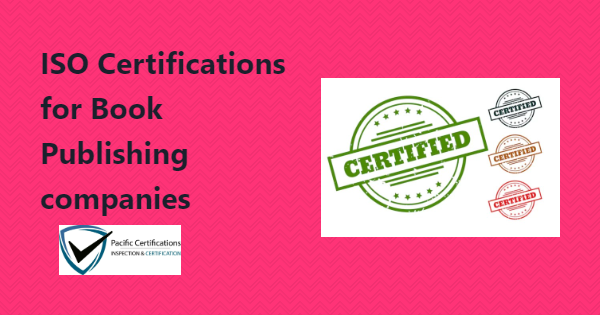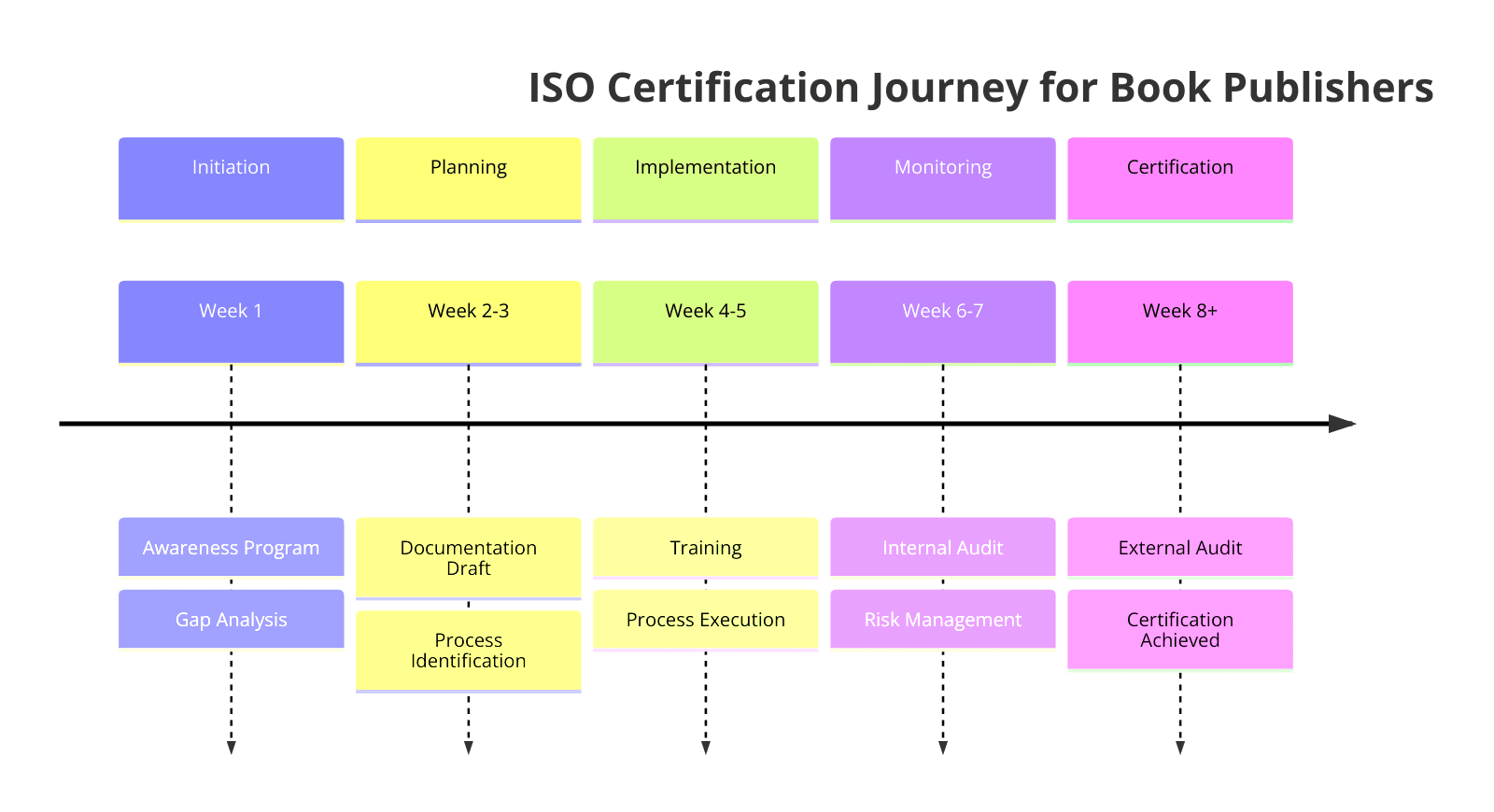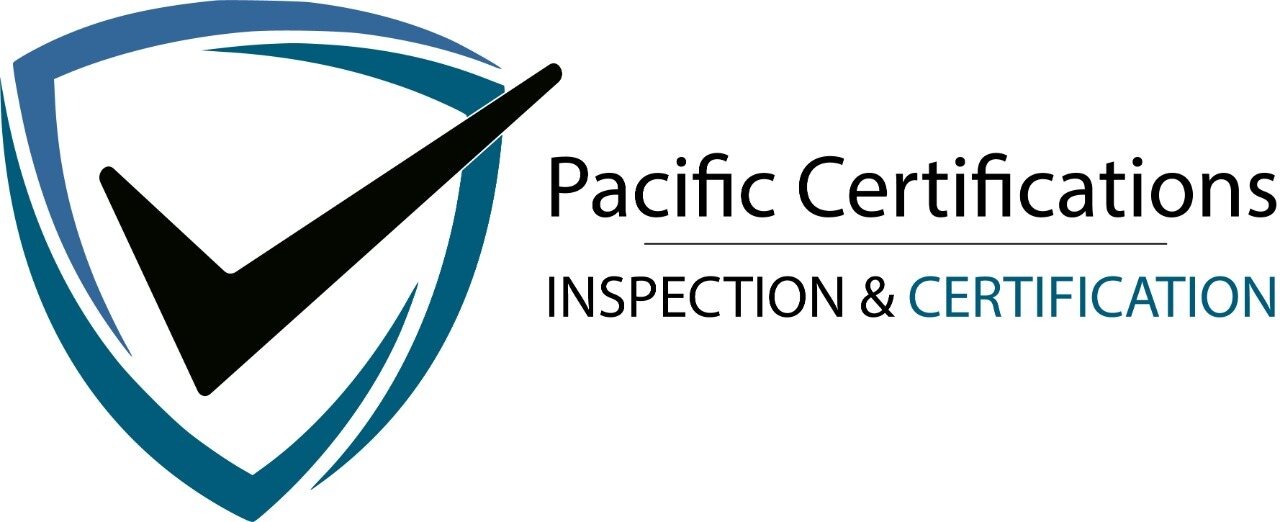ISO Certifications for Book Publishing Businesses, Requirements and Benefits

Introduction
Book publishing has evolved into a global, technology-driven industry that balances creativity with rigorous processes. From editorial quality and intellectual property protection to environmental sustainability and digital distribution, publishing businesses face increasing demands from authors, readers, and regulators.
ISO certifications provide publishers with internationally recognized frameworks to strengthen their operations and build trust with stakeholders. ISO 9001 for Quality Management Systems helps publishers ensure that their processes, from manuscript acquisition to printing and distribution, meet consistent quality standards.
In publishing, credibility depends not only on the words written but also on the systems that ensure quality, transparency, and integrity throughout the process
ISO 14001 helps publishing businesses manage their environmental impact by promoting sustainable practices in paper sourcing, printing processes and waste management. ISO/IEC 27001 is essential for ensuring that the information is securely managed throughout the editorial and production phases. These certifications enhance a publisher's credibility and reputation in market.
For certification services tailored to the book publishing industry, contact [email protected].
Applicable ISO Standards for Publishing Businesses
Below are some relevant ISO certifications for book publishing companies:
ISO 9001: Quality Management System (QMS):
ISO 9001 focuses on quality management and ensures that processes within the organization are well-defined and consistently followed. For a book publishing company, this can improve the quality of books, customer satisfaction and efficiency.
ISO 14001: Environmental Management System (EMS):
ISO 14001 helps organizations manage and reduce their environmental impact, is important for book publishers aiming to minimize their carbon footprint and adopt sustainable practices in printing and distribution.
ISO 27001: Information Security Management System (ISMS):
For publishers dealing with sensitive manuscripts and customer data, ISO 27001 is crucial. It establishes a framework for securing information assets and protecting them from data breaches and cyber threats.
ISO 45001: Occupational Health and Safety Management System (OHSMS):
ISO 45001 helps in creating a safe work environment, reducing workplace accidents, and complying with health and safety regulations.
ISO 19770: Software Asset Management (SAM):
If your company relies heavily on software for content creation and management, ISO 19770 can help in effective software asset management, reducing costs, and ensuring compliance.
ISO 26000: Social Responsibility:
This standard encourages organizations to operate in a socially responsible manner, taking into account the impact of their operations on society.
Click here to find more applicable standards to your industry
ISO Certifications Steps
To pursue these ISO certifications, you should consider the following steps:
Determine which ISO certifications are most relevant to your publishing company's goals and operations.
Identify the gaps between your current practices and the requirements of the chosen ISO standard.
Develop and implement the necessary processes and systems to meet ISO standards.
Maintain detailed documentation of your processes and compliance efforts.
Conduct internal audits to ensure ongoing compliance.
Choose a certification body like Pacific Certifications to conduct an external audit and issue the ISO certification.
Continuously monitor and improve your systems to maintain ISO certification.
If you have specific questions or need assistance with ISO certification, you can us at [email protected] for expert guidance tailored to your needs.
What are the requirements of ISO Certifications for Book Publishing Companies?
Publishing businesses must establish structured management systems that cover quality, environmental responsibility, information security, and continuity, supported by documented procedures and regular evaluations. Below are the core requirements of the most relevant ISO standards for the book publishing industry:

ISO 9001: Quality Management Systems (QMS) Requirements:
Documented QMS: Implement a structured quality management system that outlines processes, responsibilities, and procedures for all publishing operations.
Customer Focus: Ensure that customer needs and expectations (authors, readers, and partners) are met consistently through quality products and services.
Process Control: Manage key publishing processes, such as editorial work, design, printing, and distribution, with a focus on continual improvement and error reduction.
Risk Management: Identify potential risks (such as production delays or quality issues) and implement controls to mitigate them.
Performance Monitoring: Regularly assess the performance of publishing processes through internal audits, customer feedback, and performance metrics.
Leadership Commitment: Engage top management to lead quality initiatives and promote a culture of continuous improvement.
ISO 14001: Environmental Management Systems (EMS) Requirements:
Environmental Policy: Develop and maintain an environmental policy that reflects the company's commitment to reducing its environmental impact.
Environmental Impact Assessment: Identify and evaluate environmental aspects of operations, such as energy use, paper sourcing, waste generation, and printing practices.
Compliance with Environmental Laws: Ensure compliance with applicable environmental regulations and laws, such as recycling mandates or emissions standards.
Resource Efficiency: Set objectives for resource efficiency, such as reducing paper waste, using eco-friendly inks, or sourcing sustainably managed paper.
Continuous Improvement: Monitor environmental performance and take corrective actions to continually improve processes that affect the environment.
Employee Awareness: Provide training and raise awareness among employees about the importance of sustainability and environmental protection in the publishing industry.
ISO/IEC 27001: Information Security Management Systems (ISMS) Requirements:
Information Security Policy: Establish an information security policy that outlines how sensitive data (such as unpublished manuscripts, contracts, and client data) will be protected.
Risk Assessment and Treatment: Identify potential threats to information security, such as unauthorized access to manuscripts or data breaches, and develop risk treatment plans.
Access Control: Implement access control measures to ensure that only authorized personnel can access sensitive digital and physical information.
Incident Management: Establish a process for reporting, responding to, and recovering from information security incidents such as data leaks or cyberattacks.
Compliance with Data Protection Laws: Ensure compliance with relevant data protection regulations (e.g., GDPR) regarding the handling of personal and sensitive data.
Ongoing Monitoring and Improvement: Conduct regular audits, monitor information security practices, and update controls as necessary to stay ahead of emerging threats.
Tip: Start with ISO 9001 and ISO 27001 to strengthen quality and security in both print and digital publishing, then integrate ISO 14001 and ISO 26000 to enhance sustainability and ethical responsibility.
By meeting these requirements, book publishers can ensure they maintain high-quality production standards and safeguard intellectual property.
What are the benefits of ISO certifications for Book Publishing Companies?
ISO certifications offer numerous benefits for book publishing companies, enhancing both operational efficiency and market competitiveness. Below are some of the key advantages:

Improved quality of editorial, production, and distribution processes, ensuring consistency across all publications.
Stronger environmental compliance through sustainable resource use, reduced waste, and eco-friendly printing practices.
Enhanced protection of manuscripts and digital assets with robust information security controls.
Increased author and customer trust through independent certification of quality and ethical practices.
Greater competitiveness in attracting contracts, partnerships, and distribution agreements where ISO certification is valued.
Operational efficiency and cost savings through standardized workflows, reduced rework, and optimized resource use.
Stronger resilience and business continuity during market disruptions or supply chain interruptions.
Positive brand reputation by demonstrating commitment to sustainability, integrity, and professional standards.
The publishing industry continues to undergo a major transformation driven by digital adoption, sustainability requirements, and evolving reader preferences. According to PwC’s Global Entertainment and Media Outlook, the worldwide publishing market is projected to surpass USD 140 billion in 2025, with digital formats accounting for nearly 35 percent of total revenues.
E-book and audiobook sales have grown consistently, with global audiobook revenue alone expected to cross USD 19 billion by 2027, reflecting a CAGR above 20 percent. At the same time, sustainability has become a central concern, as regulators and consumers push publishers to reduce environmental impacts.
A recent study found that more than 60 percent of publishers in Europe and North America have introduced sustainability strategies, including the use of recycled paper and eco-certified inks. The rise of artificial intelligence in content generation, editorial support, and distribution platforms is also reshaping workflows, raising new compliance and copyright challenges.
Overall, ISO certifications in quality, environmental management, and information security are increasingly viewed as essential tools to meet these demands while maintaining trust with authors, regulators, and readers in a competitive global marketplace.
If you need more support with ISO certification for your Publication Business, please contact us at +91-8595603096 or [email protected]
Author: Sony
Read more: ISO Certifications for Cloud Hosting and Data Processing Services & applicable ISO standards

